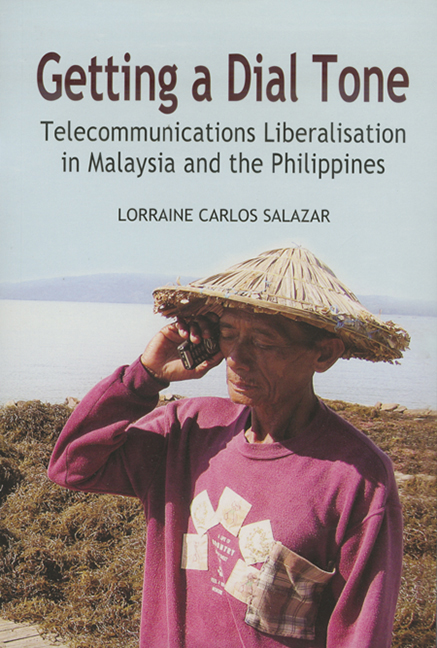Book contents
- Frontmatter
- Dedication
- Contents
- Map of Malaysia and the Philippines
- List of Tables
- List of Figures
- List of Appendices
- List of Abbreviations
- Acknowledgements
- 1 Rent-Seeking, Market Reforms, and States
- 2 Reviewing the Literature: Theories and Puzzles
- 3 Historical Overview of the State and Business in Malaysia and the Philippines
- 4 The Telecommunications Sector in Malaysia and the Philippines Before Reform
- 5 Reforming the Malaysian Telecommunications Sector
- 6 The Liberalisation of Telecommunications in Malaysia
- 7 Regulatory Reforms in Malaysia
- 8 Reforming the Telecommunications Sector of the Philippines
- 9 The New Players and the Service Area Scheme
- 10 Regulatory Reforms in the Philippines
- 11 Conclusions
- Appendices
- Bibliography
- Index
- About the Author
3 - Historical Overview of the State and Business in Malaysia and the Philippines
Published online by Cambridge University Press: 21 October 2015
- Frontmatter
- Dedication
- Contents
- Map of Malaysia and the Philippines
- List of Tables
- List of Figures
- List of Appendices
- List of Abbreviations
- Acknowledgements
- 1 Rent-Seeking, Market Reforms, and States
- 2 Reviewing the Literature: Theories and Puzzles
- 3 Historical Overview of the State and Business in Malaysia and the Philippines
- 4 The Telecommunications Sector in Malaysia and the Philippines Before Reform
- 5 Reforming the Malaysian Telecommunications Sector
- 6 The Liberalisation of Telecommunications in Malaysia
- 7 Regulatory Reforms in Malaysia
- 8 Reforming the Telecommunications Sector of the Philippines
- 9 The New Players and the Service Area Scheme
- 10 Regulatory Reforms in the Philippines
- 11 Conclusions
- Appendices
- Bibliography
- Index
- About the Author
Summary
This chapter deals with the development of the state and business in Malaysia and the Philippines, locates the reasons behind their characteristics, and outlines their interactions and power relations. The discussion emphasises crucial events that gave birth to the types of state and business class in both countries. In particular, the purpose of this chapter is to elucidate the rise of a relatively strong state in Malaysia, where a politico-administrative elite existed as early as the advent of independence, and the roots of the weak, penetrated state in the Philippines, with a poorly institutionalised and emasculated bureaucracy. While there are substantial differences between the two countries, patronage and rent-seeking are similarities that stand out but are not normally highlighted.
Malaysia is often depicted in scholarly accounts as a plural society where the concept of race is key to understanding its political, economic, and social life. Scholars often portray post-independence Malaysian politics as a form of consociationalism, whereby bargaining and consensus building among leaders of ethnic communities are the basis of government rule. However, the May 1969 racial riots marked the turning point towards a more pronounced Malay control of state power and the rise of a strong state that resolutely pursues its developmental goals. The launch of the New Economic Policy (NEP) signalled a strategy of active state participation in the economy to create a bumiputera business and entrepreneurial class through trusteeship guided by state institutions. This strategy of institutional trusteeship was replaced with individual trusteeship and ownership once the state believed that there were enough bumiputeras capable of building and running businesses of their own. Aided by state patronage and nurtured by the state under Prime Minister Mahathir Mohamad, a class of well-connected, mostly Malay, businessmen rose to prominence. This class of businessmen became the main beneficiaries of the state's privatisation and liberalisation policies.
By contrast, most scholars portray the Philippine state as weak because an oligarchic economic elite has continually raided the state and moulded state policy in accordance with its interests. The root of this economic elite is traceable to the landowning class that emerged during Spanish colonisation.
- Type
- Chapter
- Information
- Getting a Dial ToneTelecommunications Liberalisation in Malaysia and the Philippines, pp. 48 - 85Publisher: ISEAS–Yusof Ishak InstitutePrint publication year: 2007

